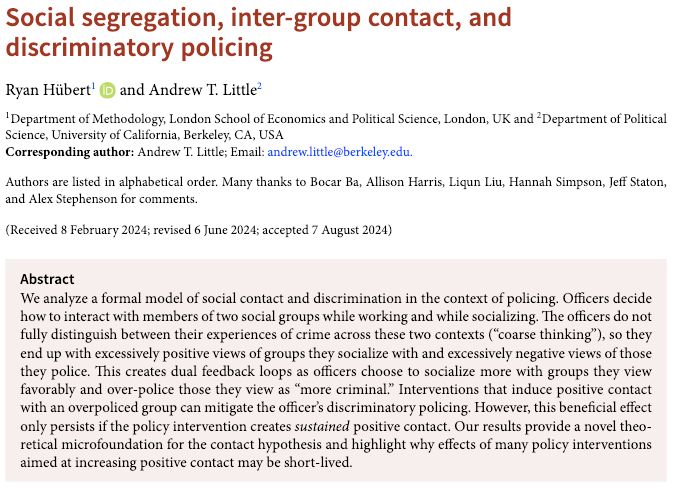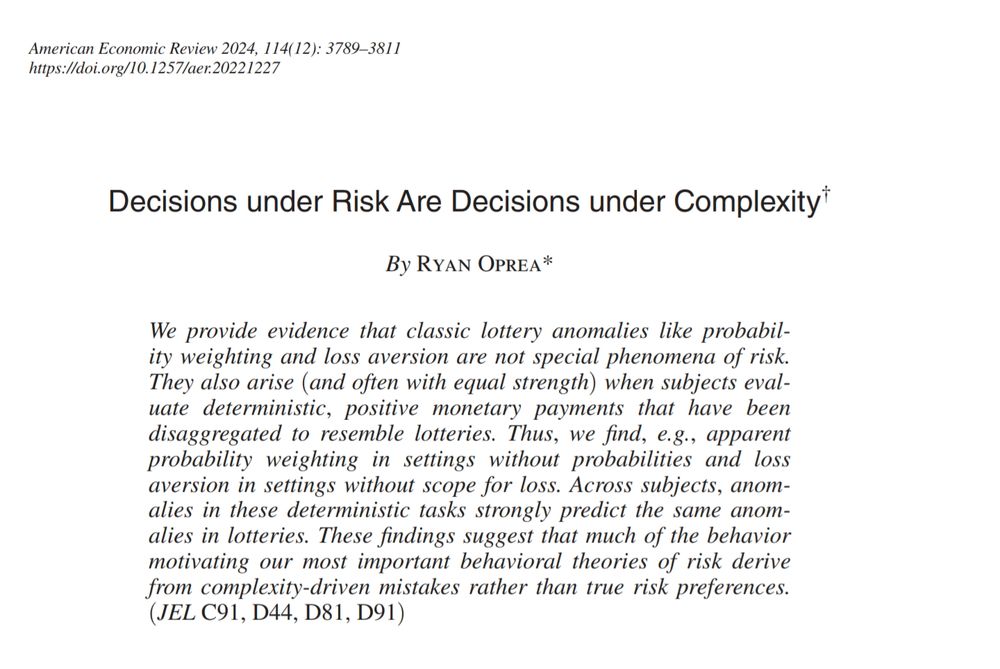
Research on US law & courts, public policy, political economy
Her project, ‘Walls and Wicked Problems: The Role of Complexity in Politics,’ will investigate how complexity shapes political discourse.
🔗 Read more: shorturl.at/5bYBw

Her project, ‘Walls and Wicked Problems: The Role of Complexity in Politics,’ will investigate how complexity shapes political discourse.
🔗 Read more: shorturl.at/5bYBw
Measuring How Much Judges Matter for Case Outcomes - cup.org/4mRvrdN
- Ryan Copus & @ryanhubert.bsky.social
#FirstView

Measuring How Much Judges Matter for Case Outcomes - cup.org/4mRvrdN
- Ryan Copus & @ryanhubert.bsky.social
#FirstView
➡️ Using a formal model, @ryanhubert.bsky.social & @anthlittle.bsky.social show how positive contact with overpoliced groups can reduce bias—but only if it is sustained over time www.cambridge.org/core/journal... #FirstView


➡️ Using a formal model, @ryanhubert.bsky.social & @anthlittle.bsky.social show how positive contact with overpoliced groups can reduce bias—but only if it is sustained over time www.cambridge.org/core/journal... #FirstView
Just like I am for US blue state politicians, I’m baffled by the center-left’s lack of a coherent growth program. It would be very popular!
Just like I am for US blue state politicians, I’m baffled by the center-left’s lack of a coherent growth program. It would be very popular!

You have to pair government money with real efforts to control costs.

You have to pair government money with real efforts to control costs.
osf.io/preprints/os...
Here is how it's relevant for your Thanksgiving dinner 🦃👇
osf.io/preprints/os...
Here is how it's relevant for your Thanksgiving dinner 🦃👇
The key idea, based on decades of strong research evidence: focus on increasing the probability of getting caught, not the punishment.
www.nytimes.com/2024/12/07/o...
The key idea, based on decades of strong research evidence: focus on increasing the probability of getting caught, not the punishment.
www.nytimes.com/2024/12/07/o...




But I think Florian’s updating too much from one experiment. I want to see replications and results from ‘nearby’ designs before saying the lottery anomalies have nothing to do with risk.
Some of the most important lottery anomalies from the behavioral risk literature (e.g., probability weighting and loss aversion) actually have nothing to do with risk.
They also arise in perfectly deterministic settings.
Lead article in the latest AER issue:
www.aeaweb.org/articles?id=...

But I think Florian’s updating too much from one experiment. I want to see replications and results from ‘nearby’ designs before saying the lottery anomalies have nothing to do with risk.
The math is extremely useful for the analyst (and replicators), but a reader can learn from a paper without deep reading all the math
Plus, pushing the idea that deep reading all the math is necessary for learning is probably a good way to turn more people off formal theory
If it’s done correctly, in equilibrium you don’t need to read the math in detail to get the ideas. That doesn’t mean the math is irrelevant.
Seems very wrong to me. I wonder what the quickest refutation is that would make sense to most practicing economists.
www.betonit.ai/p/economath_...
The math is extremely useful for the analyst (and replicators), but a reader can learn from a paper without deep reading all the math
Plus, pushing the idea that deep reading all the math is necessary for learning is probably a good way to turn more people off formal theory



I don't want a training, a coffee group, or a paid external speaker about about compassion fatigue.
I want higher pay, admin support, & actual vacation time.


@pavisuri.bsky.social (and me!). tinyurl.com/5n743sma #psjobs
@pavisuri.bsky.social (and me!). tinyurl.com/5n743sma #psjobs


